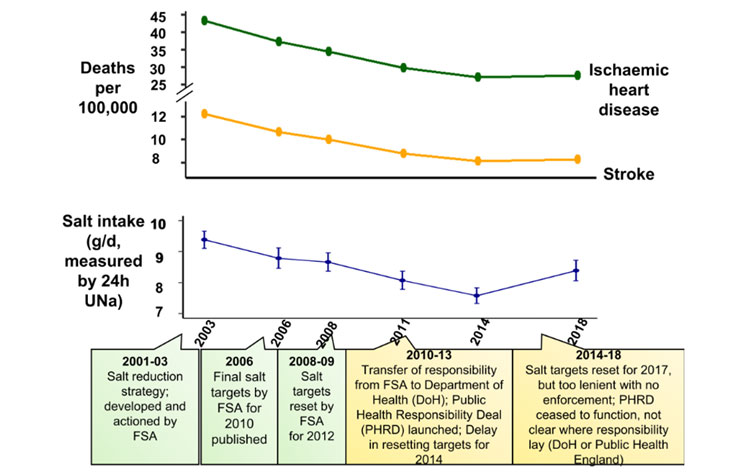Increased salt intake in England from 2014-18
An assessment of changes in salt intake in England shows that, following a reduction of 19% from 2003-2014 (from 9.38 to 7.58 grams per day), intake increased to 8.39 grams per day by 2018.

Reductions in stroke and ischaemic heart disease mortality rates in England were also observed during the height of the UK salt reduction programme from 2003-14 (from 12.24 and 43.44 cases per 100,000, to 8.19 and 27.23 cases per 100,000), but from 2014-2018 these figures plateaued. Similar trends were observed in blood pressure measurements, where decreases achieved from 2003 ceased to continue after 2014.
The paper by WIPH authors concludes that the success of the 2003-14 UK salt reduction programme, which saved more than 9,000 lives a year, stalled when the government handed responsibility for salt policy to food industries. If the programme had continued, there would have been a further reduction of 1.45 g/day in salt intake from 2014 to 2018, which would have prevented over 38,000 deaths from strokes and heart disease in that four year period. Researchers are calling for urgent action to reinvigorate the UK’s once world-leading salt reduction programme.
Graham MacGregor, Professor of Cardiovascular Medicine and co-author of the paper said: ‘This study reinforces the urgent need for a robust system where we generate worthwhile reductions in salt intake which make a positive and lasting impact. It is now up to the Government to set up a coherent strategy where the food industry is instructed what to do, rather than the food industry telling the Government what to do. We must get our salt reduction strategy back on track for the benefit of public health, the UK workforce, our overburdened NHS and the economy.’
Jing Song, Monique Tan, Changqiong Wang, Mhairi K Brown, Sonia Pombo-Rodrigues, Graham A MacGregor, Feng J He. Salt intake, blood pressure and cardiovascular disease mortality in England, 2003–2018. J Hypertension 19 September 2023. DOI:10.1097/HJH.0000000000003521